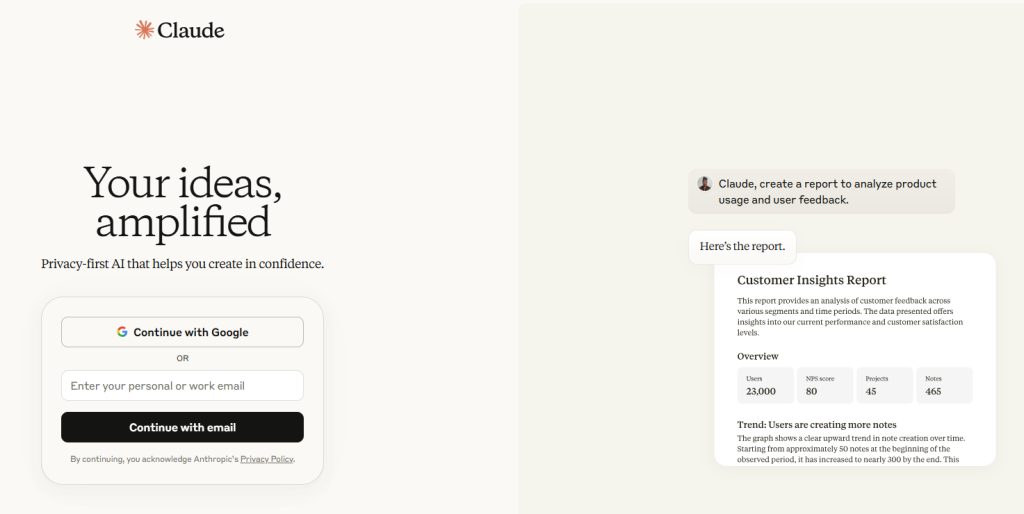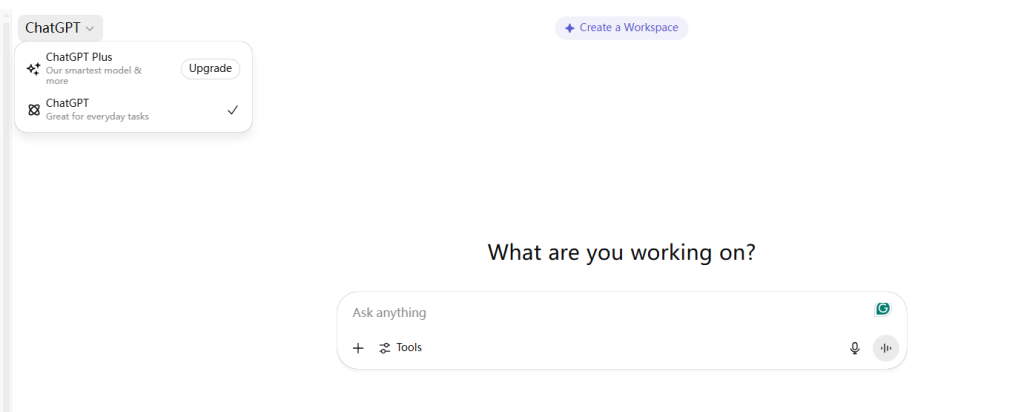AI assistants have become as essential as smartphones for many professionals, students, and creatives in 2025.
Choosing between Claude AI vs ChatGPT isn’t about finding the “better” tool – it’s about discovering which one fits your unique needs like a glove.
In this comprehensive comparison, we’ll peel back the layers of both Claude AI and ChatGPT to reveal what makes each special.
What is Claude AI?
Picture an AI that remembers every detail of your 300-page manuscript, suggests improvements with surgical precision, and writes with the elegance of your favorite author. That’s Claude AI in a nutshell. Developed by Anthropic, Claude stands out for its remarkable memory, natural writing style, and thoughtful approach to complex problems.

Anthropic offers Claude in three distinct versions, each designed for different needs:
Claude Haiku is the speed demon of the family. When you need quick answers to simple questions or lightning-fast summaries, Haiku delivers almost instantly. It’s perfect for those “I need this now” moments when you’re pressed for time.
Claude Sonnet hits the sweet spot between speed and intelligence. The latest 3.5 version has stunned experts by solving graduate-level math problems and outperforming competitors in specific knowledge tests. Whether you’re drafting important emails or working through moderately complex projects, Sonnet handles it with ease.
Claude Opus is the brainiac of the bunch. When you’re dealing with advanced coding challenges, analyzing massive legal documents, or unraveling intricate scientific concepts, Opus rises to the occasion. It’s like having a PhD-level research assistant available 24/7.
What really sets Claude apart is its astonishing memory. With a context window stretching up to 200,000 tokens (about 150,000 words), Claude can digest and recall information from documents longer than most novels. This makes it invaluable for lawyers, researchers, and anyone working with extensive materials.
What is ChatGPT?
If Claude is your brilliant but reserved study partner, ChatGPT is the outgoing, multi-talented friend who’s always up for anything. Since its 2022 debut, ChatGPT has become the gateway to AI for millions, thanks to its user-friendly design and wide range of capabilities.

ChatGPT comes in two primary versions:
GPT-3.5 is the free version that made AI accessible to the masses. It handles everyday tasks like answering questions, explaining concepts, and even writing simple code with impressive competence. While it might not have the latest knowledge or most advanced features, it’s more than capable for casual users.
GPT-4 (available through ChatGPT Plus) is where things get serious. For $20/month, you get significantly improved reasoning, better coding skills, and the ability to process images in some versions. It’s like upgrading from economy to first class – the basic function is the same, but the experience is noticeably better.
ChatGPT’s killer feature is its versatility. Need to analyze data in a spreadsheet? The Advanced Data Analysis tool (formerly Code Interpreter) lets you upload files and get insights. Want to create a custom AI assistant for your specific needs? The GPT Store offers specialized versions for everything from cooking to coding.
You Might Also Like: How to Use ChatGPT to Write Emails?
Claude AI vs ChatGPT: Key Differences
Now that we’ve met both contenders, let’s examine how they stack up in areas that actually impact your daily use.
1. Brainpower and Knowledge
Both AIs are incredibly smart, but they apply their intelligence differently. For years, GPT-4 was considered the gold standard for complex reasoning, but Claude 3.5 Sonnet has not only caught up but surpassed it in some academic benchmarks like graduate-level math problems.
In practice, ChatGPT tends to provide more expansive answers, often including background information you didn’t ask for. Claude, meanwhile, gets straight to the point with concise responses. It’s the difference between a professor who gives a 30-minute lecture to answer your question and one who provides a crisp, two-sentence response.
2. Coding Capabilities
For programmers, both tools offer substantial value but cater to different workflows. ChatGPT’s Advanced Data Analysis feature lets you run and debug code right in the chat window – invaluable for quick tests and data visualization. Many developers appreciate how it feels like having a coding partner always ready to help.
Claude takes a different approach. Users consistently praise its clean, efficient code that often requires less tweaking. Its “Artifacts” feature allows previewing code outputs without leaving the chat, making the development process smoother. If ChatGPT is your enthusiastic coding buddy, Claude is your meticulous code reviewer.
3. Writing Style
Ask both AIs to write a product description, and you’ll notice distinct voices emerge. ChatGPT produces polished, professional copy that sometimes leans generic without specific guidance. Claude’s writing tends to be more nuanced and natural, often finding creative angles without excessive prompting.
For example, asked to describe a coffee shop, ChatGPT might say: “A cozy café offering artisanal coffee blends in a warm, inviting atmosphere.” Claude might offer: “The rich aroma of freshly ground beans greets you as sunlight filters through the windows, highlighting the swirls of steam rising from each carefully crafted cup.”
4. Handling Long Documents
This is where Claude truly shines. Its massive context window means it can process and analyze documents the length of “War and Peace” without breaking a sweat. Researchers, lawyers, and authors find this invaluable for working with lengthy manuscripts, legal briefs, or research papers.
ChatGPT, while capable, maxes out at about 8,000 tokens (roughly 6,000 words) for most users. This means splitting long documents into chunks – a workable but less elegant solution.
5. Everyday Use
For general knowledge questions, ChatGPT currently has an edge thanks to its optional web browsing capability (when enabled). This allows it to pull in recent information, while Claude relies solely on its training data up to its knowledge cutoff.
However, Claude often provides more straightforward answers to factual questions without the extra commentary ChatGPT sometimes includes. It’s the difference between getting a direct answer versus one wrapped in several paragraphs of context.
Which One Should You Choose? A Decision Guide
Still unsure? Here’s a quick cheat sheet:
Choose Claude AI if you:
- Regularly work with book-length documents
- Prefer concise, natural-sounding writing
- Want cleaner, more efficient code output
- Value a straightforward, no-nonsense interface
Choose ChatGPT if you:
- Need access to recent information (via web browsing)
- Want to run code and analyze data in-chat
- Enjoy customizing your AI with specialized GPTs
- Prefer more detailed, explanatory responses
Conclusion on Claude AI vs ChatGPT
As we navigate 2025, both Claude AI and ChatGPT continue pushing the boundaries of what AI assistants can do. ChatGPT remains the versatile, feature-packed option that brought AI to the mainstream. Claude has carved its niche with unparalleled memory, refined writing, and thoughtful analysis.
You don’t necessarily have to choose. Many professionals use both – Claude for deep work with documents and precise writing, and ChatGPT for general knowledge and data tasks. As these tools continue evolving, their capabilities will only grow more impressive.



